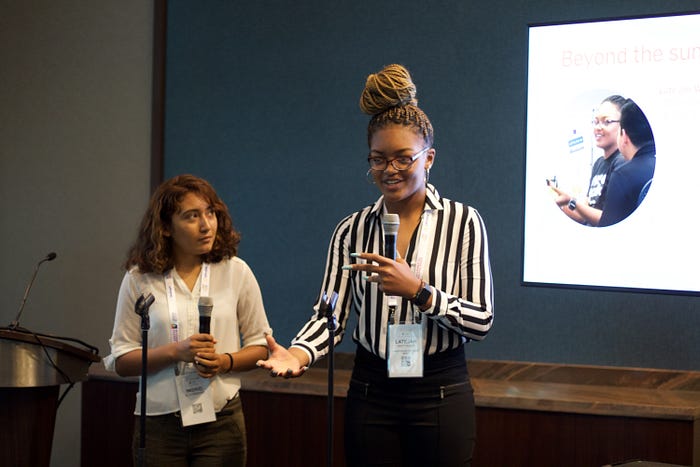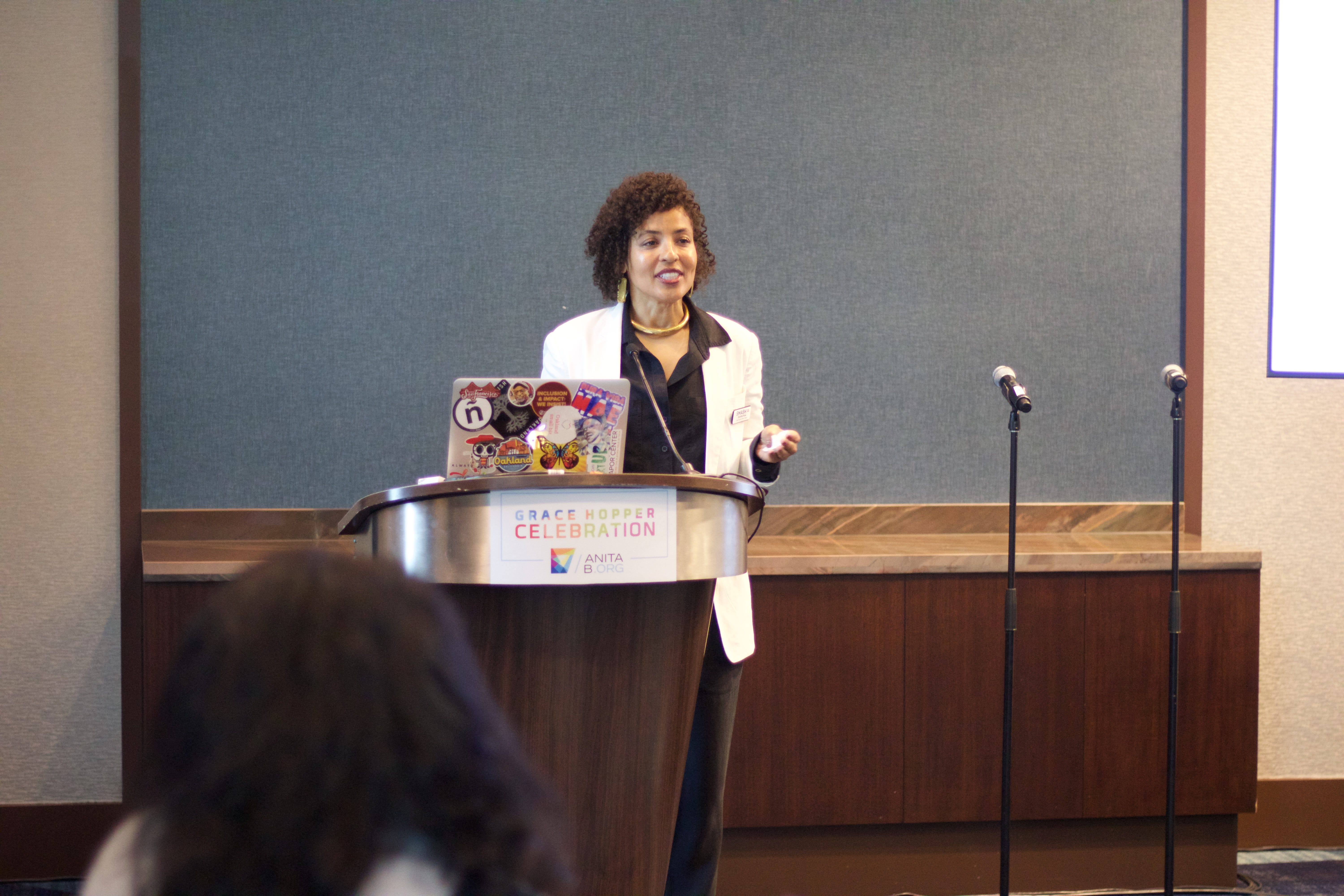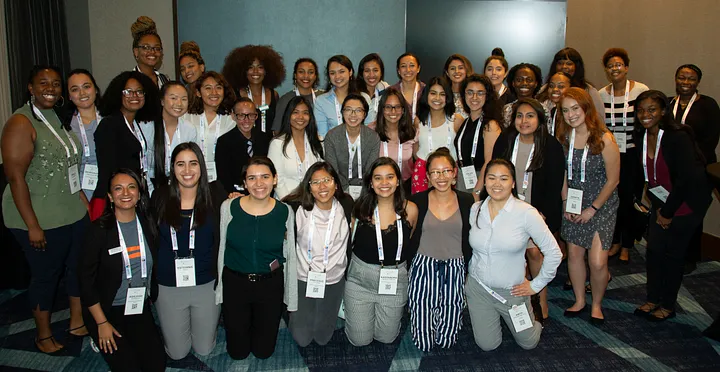At a Philadelphia computer corporation lab in 1953, someone told Grace Hopper, “No.”
Hopper, a Navy veteran who wrote the manual for the first U.S. electromechanical computer, suggested writing programs using words instead of mathematical symbols, but was told her simpler and more accessible idea would never work. In 1956, her team operated FLOW-MATIC, the world’s first programming language to use word commands.
Since 1994, the Grace Hopper Celebration has honored her legacy. Thousands gathered in Houston last week at what’s now become “the world’s largest gathering of women technologists” to network, build relationships, and collaborate among people who, like Hopper, have had their talent questioned and their ideas dismissed, simply because they are women.
But while women in tech, or the lack thereof, has been at the forefront for several years now, the industry has failed in addressing a much more prevalent issue — the lack of underrepresented women of color in tech, specifically, Black, Latinx, Southeast-Asian and Pilipinx. “Women” has been conflated to mean “White Women,” and in tech, has resulted in gender advocacy that only benefits this one group.
So how do you show tech that woman of color exist and belong in tech too?
You bring them to Grace Hopper!

I was proud to join more than 50 SMASH alumnae at this year’s conference in a first-ever partnership with Anita.B.org. For most of these young women who, like me, came through SMASH’s flagship STEM exposure and college-readiness program, SMASH Academy, (the OG STEM program as I like to call it), the 2018 Grace Hopper Celebration (GHC 18) was their very first conference experience.
Included in this historic delegation (#SMASHGHC18) was Ingrid Altamirano, (SMASH Stanford 2018) and Late’jah Whittaker (SMASH Berkeley 2017), both SMASH Rising scholars and two remarkable young women who emphasized how important empowerment spaces for women of color in tech can be. Against the backdrop of a Silicon Valley culture that still de-prioritizes serious, comprehensive D&I strategies, young women like Ingrid and Late’jah are often running against the current, dealing with the “double-bind” of being both a woman AND a woman of color.

Ingrid told me from a room just slightly removed from the bustle of the ongoing conference.
“Being in a place where I see other people who look like me inspires me to think that I can actually be in that place. I think it’s really important to see that whole perspective, that there are women out there who have careers [in tech] and I can do that too.”
Late’jah said after she was asked why it was important to be a SMASH alumna participating in GHC 18:
“One thing the conference has helped me with is getting rid of taboos I initially had of the tech industry and being able to make it, and staying in this field.”
“[Receiving] constant affirmations about what’s possible has been really important for my confidence as a woman in tech, and that’s a really important aspect of being here.”
“It’s really reassuring to have a community to come back to,” Ingrid interjected, before the two bounced back thoughts about the importance of having a strong support network.

Both women stressed how SMASH provided the initial spark of interest in tech and the foundational tools to learn about computer programming, but also the networks crucial to navigating college courses, internships, or, well, world-renowned tech conferences. Just as Late’jah finished explaining how she reached out to fellow SMASH classmates and colleagues for help with a computer science assignment, Ingrid jumped in to give an anecdote about calling upon another SMASH colleague to help navigate the oft-complicated college financial aid system. Both echoed the other’s underlying sentiment — how good and reassuring it felt to simply know someone was going through the same struggles as you, with a shared place and perspective.
“I have had real imposter syndrome, and so going through SMASH Rising specifically and being in a tech company, knowing it’s not as scary or as difficult or intimidating, and being able to see it first-hand from the people at Grace Hopper, it makes me feel more at ease about being able to do what I want to do and becoming a software engineer,” Late’jah said.
“It’s amazing that I can start to feel a little more confident about my abilities because of who I’ve met, and what they’re doing and knowing that’s possible for me.”
For both Late’jah and Ingrid, GHC 18 was their first tech conference (almost certainly of many to come), so while neither could speak to how this conference could compare to more mainstream events, each spoke glowingly of their time spent, the interviews and dinner invites they received, and the connections they made. And while acknowledging the unfortunate rarity of similar spaces, each spoke profusely about how “motivating” and “inspiring” it was to see people who look like them at the helm of major, industry-driving companies.

Perhaps one of the most powerful moments at the Grace Hopper Celebration was at the private SMASH Networking Reception hosted by AnitaB.org and SMASH. As the formal program concluded, our founder, Freada Kapor Klein, asked that all the SMASH women in the room stand up. As one of the oldest alumnae in the room — coming up on 10 years since SMASH — I was so moved to see how far my program had come and I left the reception feeling hopeful. In the midst of a heart-wrenching week in politics and the #MeToo movement, I was so thankful to have my cup refilled by my fellow SMASH women around me.


Representation matters, and not because more of us just need to be in the room. It matters because we need people receptive to ideas outside of the status quo; because we need people in decision-making positions of power who can represent groups beyond the privileged. Most importantly, representation matters because there are people who will look at women like Grace Hopper, at women like GHC keynote speaker — and Kapor Capital portfolio founder — Jessica O. Matthews, or at women like Ingrid Altamirano and Late’jah Whittaker and think,
“I can do this. This is possible for me too.”


